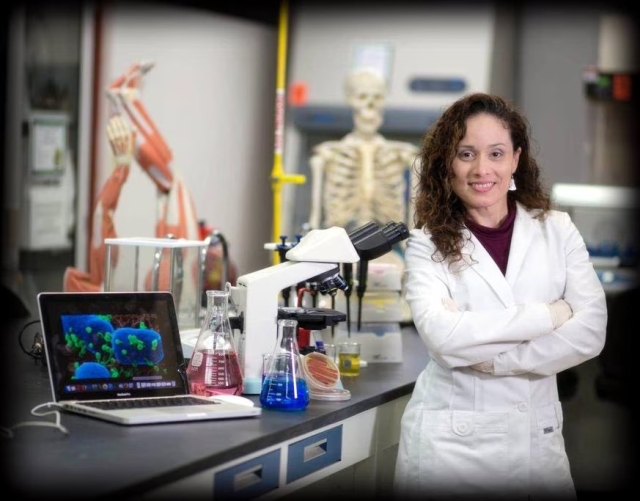American Association for Microbiology highlights contributions of Puerto Rican scientist
Submitted on 6 June 2023 - 11:39am
This article is reproduced by CienciaPR with permission from the original source.
CienciaPR Contribution:
Original Source:
By:

Environmental microbiologist Elizabeth Padilla Crespo is the first Puerto Rican to be included in a book by the prestigious organization.
As a young girl, when her interest in science began to blossom while studying in the urban center of Mayagüez, Elizabeth Padilla Crespo did never imagined that her name would occupy the same pages as those dedicated to the greatest in the field, such as the Dutchman Antonie van Leeuwenhoek, recognized as the "father of microbiology".
Now, at 41 years old, the environmental microbiologist can proudly state that she is the first Puerto Rican woman to be featured in a book by the American Society for Microbiology (ASM), which, since its publication in 2022, assists the education of university and college students around the world.
"I felt a mixture of emotions, (I was) in shock. It was unreal and, at the same time, I felt humbled to be there, I couldn't believe it. It was a mixture of shock, amazement and happiness," the doctor shared in a telephone interview with El Nuevo Día.
For the Distinguished Research Professor at the Inter-American University of Puerto Rico Aguadilla Campus, the fact that her work is highlighted in the publication "Microbe, 3rd Edition" is not only evidence of progress in the inclusion of minorities in science, but can serve as an inspiration for young Puerto Rican or Hispanic women -in the United States and around the globe- to continue developing in this field, historically dominated by men.
"Imagine a student of mine now at Inter-American studying microbiology, or one who is in Rio Piedras (University of Puerto Rico, UPR) and they meet someone who looks like them, someone who is from Mayagüez, Puerto Rico, with a similar history of development, that can motivate them to move forward," she said.
According to the ASM itself, the inclusion of Padilla Crespo as an outstanding microbiologist marks the first time that a Puerto Rican microbiologist is mentioned in one of its titles. Dr. Gary Toranzos, professor of microbiology at UPR, has contributed to some of the organization's publications.
"It's a nice contrast, because in these books they talk about the history of microbiology and that was a male-dominated era, because women had very little access to the university. ASM fulfilled its interest in publishing a book that has diverse stories and represents the diversity we have today," added the scientist.
ASM's approach to include Dr. Padilla Crespo in the publication - authored by Michele S. Swanson, Elizabeth A. Joyce and Rachel E. A. Horak - came in the midst of the COVID-19 pandemic. Last summer, she was notified that the book was to be published by renowned publisher Wiley.
The scientist was featured on page 100 of the 752-page publication. In writing about the professor, ASM breaks down several of her accomplishments, as well as the impact on her of a 2015 report while she was a student at the Georgia Institute of Technology, which posited, among other things, "Minority women made up about 1 in 10 people employed in science and engineering occupations."
"All these famous scientists of the past come from (a context) quite different from ours, especially those who were European. With this book, I manage to diversify the face of science, of microbiology."
ELIZABETH PADILLA CRESPO
Currently, the researcher indicated that she is working on three projects with her lab team in Aguadilla. The first, funded by the U.S. Department of Agriculture, studies microorganisms that are native to the soil, which can produce natural antibiotics that would be beneficial for plants and humans alike.
Another project, in its initial phase, funded by the U.S. National Science Foundation, seeks to develop a Virology Institute that would be "the only one of its kind in Puerto Rico". Four U.S. universities are participating in this initiative. Finally, she emphasized that she is also immersed in studying microorganisms in the environment that have "biotechnological potential".
About eight years ago, after exploring parts of the world she never imagined visiting as part of her scientific work, Padilla Crespo returned to her country, from where she has no plans to leave.
"Now, I see myself coming to that place where I wanted to help train the new generation of Puerto Rican scientists, giving them the same opportunities that were given to me, so that they may develop. Yes, they may perhaps at some point leave the island to acquire training, (but) I think they are brains that we can capture back, as it happened to me, to help the knowledge economy in Puerto Rico," she concluded.







